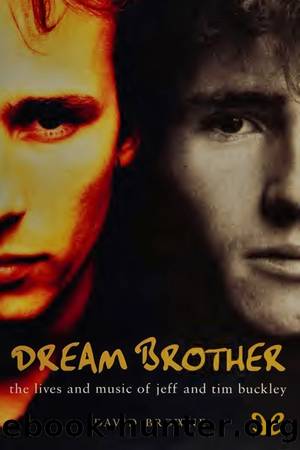Dream Brother. The Lives & Music of Jeff & Tim Buckley by David Browne

Author:David Browne [Browne, David]
Language: eng
Format: epub
Tags: Divulgación, Biografía, Música
Publisher: ePubLibre
Published: 2001-01-01T00:00:00+00:00
* * *
By early 1970, Larry Beckett had had an eventful eighteen months, albeit in the worst ways. After being drafted, he had been assigned to a fort near Monterey in Northern California and another in Missouri. Desperate to get out before he was shipped to Vietnam, Beckett went AWOL and, upon being caught, was sentenced to the stockades. Beckett did his best to act strangeâwhich his friends say wasn't terribly difficult for the lost-in-his-thoughts Beckett to doâand after a stay in a stay in a state mental hospital, he was eventually discharged as unsuitable for combat. Manda Bradlyn, who had become Beckett's lover during the later Venice days, was now living in Portland, Oregon, and Beckett, still sporting his army crew cut, relocated there to live with her. (In terms of his own military obligation, Tim was more fortunate; according to Cohen, he and other Cohen clients like Captain Beefheart and members of the Mothers of Invention were deemed 4-F. âWould you want them in your army?â Cohen cracks.)
Back in Portland, Beckett played the first side of Lorca and was so disheartened he couldn't bring himself to flip the LP over. Still, he couldn't resist when Tim called and said he wanted to write a new batch of songs with his old friend. Tim flew up to Portland, and the two bore down on a lyric idea Tim said was inspired by a dream. Out came âI Woke Up,â the first song Tim and Beckett had written together in two years. Although Beckett wasn't completely happy with the lyric, Tim was inspired by its unorthodox imagery and rhyme scheme (the line âOh, I see your woman in the raw/Ride a mare of stone and howlâ is a lesbian image, according to Beckett). It seemed a fine match for the music he was writing, although Beckett had no idea what that music was.
The duo collaborated on several more songs. âMontereyâ began as a Beckett poem recalling the time Bradlyn left him while he was locked away. Ever since his days in French club at Loara High, Tim had always wanted to sing a song in that language, so Beckett came up with âMoulin Rouge,â a jaunty reverie half in French and half in English. Again, Beckett had no idea what the accompanying melodies would be; all he heard were mentions of atonality and various time signatures.
Those elements were the least of it. As Tim told a reporter several years later, âWe decided that, now that we're good at this, we'll present a new way of writing a song.â By this time, Underwood's role in the band had been quietly usurped by John Balkin. The bass player had turned Tim on to avant-classical composers like Olivier Messiaen and Krzysztof Penderecki, and as he so often did, Tim sucked up the sonic input like an audio vacuum cleaner. For Tim's new project, Balkin assumed an even larger role than he had on Lorca. He recruited Buzz Gardner and his saxophone-playing brother John âBunkâ Gardner (all three had a side project, the Menage a Trio, devoted to experimental music).
Download
This site does not store any files on its server. We only index and link to content provided by other sites. Please contact the content providers to delete copyright contents if any and email us, we'll remove relevant links or contents immediately.
The Goal (Off-Campus #4) by Elle Kennedy(13673)
Kathy Andrews Collection by Kathy Andrews(11831)
Diary of a Player by Brad Paisley(7581)
Assassin’s Fate by Robin Hobb(6216)
What Does This Button Do? by Bruce Dickinson(6207)
Big Little Lies by Liane Moriarty(5804)
Altered Sensations by David Pantalony(5104)
Pale Blue Dot by Carl Sagan(5008)
Sticky Fingers by Joe Hagan(4198)
The Death of the Heart by Elizabeth Bowen(3622)
The Heroin Diaries by Nikki Sixx(3550)
Confessions of a Video Vixen by Karrine Steffans(3309)
Beneath These Shadows by Meghan March(3308)
How Music Works by David Byrne(3270)
The Help by Kathryn Stockett(3147)
Jam by Jam (epub)(3092)
Harry Potter 4 - Harry Potter and The Goblet of Fire by J.K.Rowling(3074)
Computational Linguistics and Intelligent Text Processing: 20th International Conference, CICLing 2019 La Rochelle, France, April 7â13, 2019 Revised Selected Papers, Part I by Alexander Gelbukh(2995)
Strange Fascination: David Bowie: The Definitive Story by David Buckley(2872)
